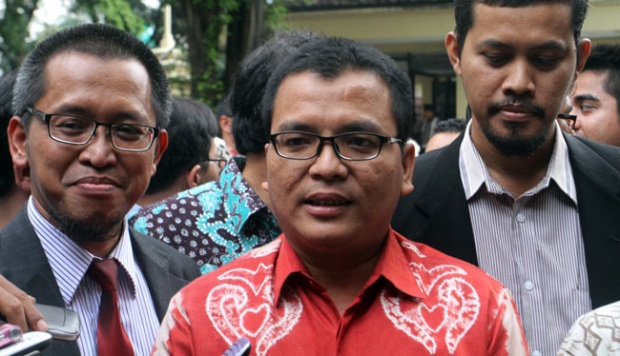
TEMPO.CO, Jakarta - The corruption charge against former Deputy Minister for Justice and Human Rights Denny Indrayana is clearly a made-up case. Indicted last week, he is being charged with graft over the payment gateway system, intended for the efficient production of electronic passports. But in reality, this may have been nothing more than a case of misadministration.
In 2014, the Justice and Human Rights Ministry sought to eliminate middlemen in its service to provide citizens with passports. By paying manually, the applicant is often extorted for money, besides having to wait in line endlessly to be served by the clerk. Paying the fee through banks was equally inefficient, because the application would still have to be submitted manually, after waiting in line for some time.
That was when the idea came to pay the fee through the payment gateway-by credit or debit card, which would involve banks and the private sector. The applicant needs to pay Rp5,000 per passport, and other related fees.
But the Supreme Audit Agency (BPK) deemed the payment gateway system as deviating from the articles of the Law on Non-Tax Revenues (PNBP), because the money would not be directly deposited into the state coffers. The companies managing the fees failed to get the approval of the Finance Ministry, which suggested instead, that the Justice and Human Rights Ministry (which oversees the Immigration Department and passports) use the Online PNBP Information System (Simponi). The problem was that Simponi needed a whole year to install. The rejection by the Finance Ministry forced the project to come to a halt.
It is certain that Denny did not enrich himself or any other by this project. The two appointed vendors got Rp605.8 million-a far smaller amount than the investment they had already put in. Denny claimed to not have received a cent from the project. The payment gateway system was also not a required option for consumers, who were given the option to pay their fees manually.
But Denny neglected one administrative step, which was to pay the fine as required by the rules of the Finance Ministry. It is difficult not to suspect that the forced criminal charges against Denny are part of efforts to undermine the Corruption Eradication Commission (KPK) and its supporters. After the KPK indicted Police Comr. Gen. Budi Gunawan for bribery, the police started its retaliatory attacks. Two KPK chairmen, Abraham Samad and Bambang Widjojanto were indicted, for separate cases. Denny is now the third person to be a indicted for a crime seen by many to be forced and manipulated.
Strangely, some people compare this payment gateway case with that of the Law Agency Administrative System (SABH), which involved a number of officials in the Justice and Human Rights Ministry. In this case, money did change hands to a third party-and benefitted certain ministry officials in the form of 'operational costs'. In court, the accused were later found innocent of the charges.
The police must halt the Denny Indrayana case. Politicians supporting the police must stop referring to this as a case of enforcing the law. This infers that the case is a criminal one, when it is clearly an administrative case.
President Joko Widodo has repeatedly asked the police to stop criminalizing cases. Ignoring the president's instruction is a clear violation, if not worse. But preventing the police from committing excessive criminalization should not be seen as intervention on the part of the head of state towards a legal process. In fact, it should be seen as the president's commitment to producing a professional and orderly police force. (*)





















